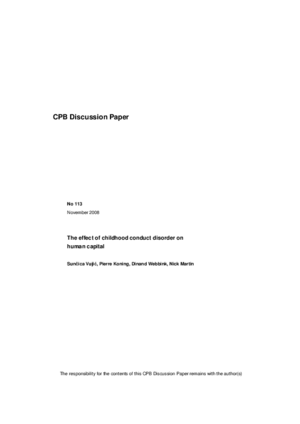The effect of childhood conduct disorder on human capital
Probleemgedrag op jonge leeftijd sterk nadelig voor kans op onderwijssucces
We are sorry, unfortunately there is no English translation of this page.
This paper estimates the longer-term effects of childhood conduct disorder on human capital accumulation and violent and criminal behaviour later in life using data of Australian twins.
We measure conduct disorder with a rich set of indicators based on diagnostic criteria from psychiatry (e.g., aggression to people and animals, destruction of property, deceitfulness or theft, and/or serious violations of rules). Using ordinary least squares (OLS) and twin fixed effects (FE) estimation approaches, we find that early (pre-18) conduct disorder problems significantly affect both human capital accumulation and violent and criminal behaviour over the life course. For instance, within pairs of identical twins we find that conduct disorder reduces the probability of high school graduation with 4 to 13 percent points and increases the probability of being arrested with 7 to 16 percent points. Robustness checks suggest that these estimates may be lower bounds of the true effects of conduct disorder.
In addition, we find that conduct disorder is more deleterious if these behaviours occur earlier in life. We conclude that childhood mental health problems have high human and financial costs for families and society at large. Effective treatments early in life might yield high returns.
